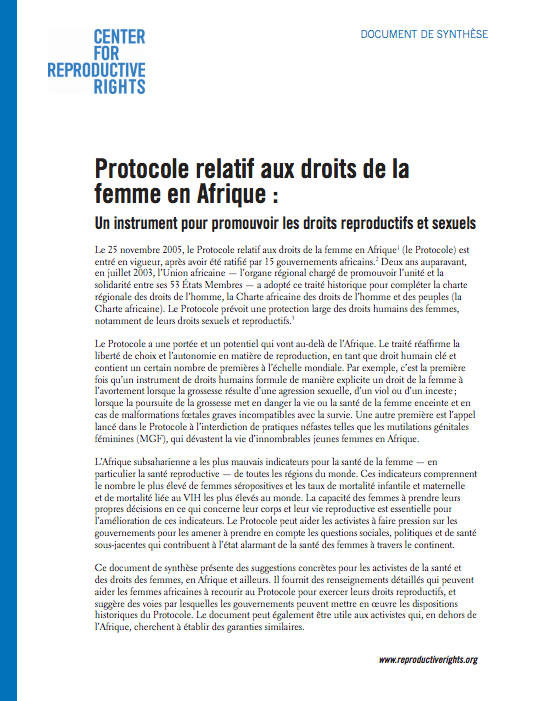New Report: Tanzania Forces Girls to Undergo Invasive Pregnancy Tests, Expels Pregnant Students
Study by Center for Reproductive Rights finds schools routinely violate adolescents’ basic human rights
(PRESS RELEASE) Adolescent girls in Tanzania are routinely—and often without warning—subjected to invasive, mandatory pregnancy testing, which has led to more than 55,000 pregnant students expelled or forced to drop out of school in the last decade, according to a new report from the Center for Reproductive Rights.
The findings released today in Forced Out: Mandatory Pregnancy Testing and the Expulsion of Pregnant Students in Tanzanian Schools report on not only the vast numbers of young women affected by this degrading policy, but also the serious human rights implications of forced pregnancy testing and the expulsion of pregnant girls from school.
“Forcing adolescent girls to undergo pregnancy tests in Tanzanian schools is degrading and utterly discriminatory, and violates both national and international human rights law—regardless of whether these young women are pregnant or not,” said Lilian Sepúlveda, director of the Global Legal Program at the Center for Reproductive Rights.
“Denying pregnant girls their right to an education is a gross violation of fundamental human rights.”
In the report, the Center uncovered that these practices are being used by school officials to shame and scare adolescents in an effort to prevent premarital sex and pregnancy. However, schools fail to provide reproductive health education or services that could arm students with the information they need to prevent pregnancy. Not surprisingly, contraceptive use among adolescent girls in Tanzania remains minimal: only 10.7 percent of sexually active women aged 15-19 report using any birth control method.
“Adolescents have the same fundamental human rights as adults, and just like adults, should be able to access the tools they need to make informed choices about their reproductive health,” said Dr. Clement Julius Mashamba, advocate and the third Vice President of the African Committee of Experts on the Rights and Welfare of the Child.
“By denying adolescents access to contraceptives and reproductive health education, schools are forcing pregnant girls into early childrearing at the expense of their education and other life goals.”
Forced Out revealed that in addition to lack of reproductive health education and services, the Tanzanian government has failed to address the high rates of sexual assault and early marriage in the country—two serious contributing factors to the instance of adolescent pregnancy.
According to a 2009 national survey commissioned by the United Nations Children’s Fund, nearly three in 10 women between the ages of 13 and 24 in mainland Tanzania reported experiencing at least one instance of sexual violence before turning 18 years old. Adolescents from rural area and marginalized communities are more vulnerable to forced sexual encounters, placing them at an even greater risk of an unplanned pregnancy.
Although the Tanzanian government recognizes early marriage often leads to adolescent pregnancy, the country’s own laws allow girls as young as 15 to be married—with 40 percent of adolescent girls in Tanzania married by the time they are 18, many of whom report being forced into sexual activity.
Among the report’s various recommendations, the Center calls on the Tanzania government to immediately end the illegal practice of forced pregnancy testing in schools and ensure that adolescent girls can continue with their education during and after pregnancy.
“If the Tanzanian government really wants to curb the high adolescent pregnancy rate, the Ministry of Education must create and enforce policies to protect female students from sexual violence and coercion in schools,” said Evelyne Opondo, regional director for Africa at the Center.
“Furthermore, schools must be required to provide quality sexual and reproductive health education and Tanzanian law must be amended to align with international human rights law by raising the marriage age for women to 18 years old.”
The report details more than a dozen personal accounts of young women subjected to mandatory pregnancy testing in either primary or secondary school, many of whom describe the experience as shameful, terrifying and painful—and for those expelled they felt ostracized from their family and friends, and worse, that their chances at an education and future were ripped away.
“What hurt most for me was the way my family turned their back on me,” said Sikudhani (a pseudonym), one of the young women interviewed. “Even after I had a stillborn and wanted to go back to school, my mom said the family had given up on me and would not support my dreams for an education.”
In addition to interviewing former and current students from throughout the country, including Iringa, Kilimanjaro, Pwani, Dar es Salaam and Morogoro regions, the Center and Yale Law School’s Allard K. Lowenstein International Human Rights Clinic interviewed more than 26 key stakeholders and experts in education, children’s rights, and health, to better understand the legal and policy context in which these practices occur. The Center also reviewed government laws, regulations, policies, guidelines and studies pertaining to education, school health and adolescent health.

